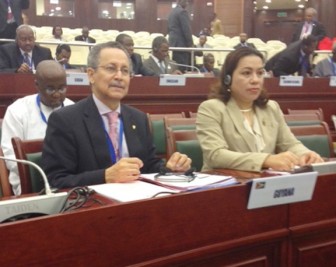Economic Partnership Agreements are of dubious value for poverty eradication and Minister of Foreign Affairs Carolyn Rodrigues-Birkett has called on the African, Caribbean and Pacific (ACP) grouping to seriously reflect on and probe deeply into the extent to which poverty eradication as well as sustainable development and integration into the global economy have been achieved.
Speaking earlier this week on the ‘Status of the ACP Group towards 2015 and Beyond’ during the 7th Summit of ACP Heads of State and Government, in Malabo, Equatorial Guinea, Rodrigues-Birkett said that the longstanding and privileged ACP-European Union relationship is also challenged. “The relationship once predicated on aid and preferential trade has shifted with great emphasis on ‘political dialogue’ and reciprocal trade arrangements through Economic Partnership Agreements that remain contentious and of dubious value for poverty eradication,” she said, according to a transcript of her speech.
“With this in mind, this summit has reason to seriously reflect and probe deeply into the extent to which ‘the eradication of poverty’ and ‘sustainable development’ as well as our ‘integration into the global economy’ have been achieved. Such an assessment of our past and the nature, benefits and prospects of our partnership with Europe is all the more important as we approach the 2015 5-Year Review of the Cotonou Agreement,” the minister said.

Rodrigues-Birkett told the Summit that the ACP Secretariat must be a dynamic, proactive knowledge management, nerve-centre of the organisation and over time become self-financing of its core operations. The question of financial sustainability of the organisation also needs to be addressed in a very objective, balanced, just and phased manner, the minister said.
“I believe first and foremost must be the political commitment to live up to our assessed contributions, arrived at in a fair and progressive manner. Of course, the returns and benefits that come to our countries and regions have to be taken into account alongside the most efficient and effective use of our contributions,” she asserted. The minister added that the question of “financial sustainability” cannot be determined “here and now” or by a simple request for an increase in the proportion of the operational costs now dependent on 50% from the European Development Fund.
She noted that since it is most likely that with the next EDF for 2014-2020 continued institutional support will be negotiated, this allows a realistic period of seven years in which to design and adopt specific measures for improved financial sustainability of the ACP. “I am proposing that this be a priority area on which the Ambassadorial Working Group must concentrate its attention,” she said.
Rodrigues-Birkett also declared that the states must deepen and widen the scope of engagement of the ACP as a group and the promotion of Intra-ACP cooperation. “This must address exchanges in the areas of trade and commercial linkages, technology transfer, agriculture and food security, cultural cooperation and south-south cooperation. A priority can be a specialized ACP Trade Financing Facility with technical assistance for sound investment proposals,” she said.
The minister stated that it is important for the ACP to recapture its political resonance by enlarging engagement through new and diversified partnerships. “The numerical strength of 79 developing countries has to be marshaled and focused on critical issues that are affecting the daily lives of millions of people in the Global South,” she declared. Rodrigues-Birkett added that additional importance must be attributed to a suitable mechanism for collaboration with the Group of 77 to join in strong political advocacy on issues of mutual concern throughout the United Nations system.
“It is not enough for the ACP Group to have Observer Status in the United Nations but exercises only a periodic presence. How this is to be enhanced and on what issues of Global Governance and its systematic reform will require further thought,” she stated.
Rodrigues-Birkett had also noted that an array of new and emerging issues on the global agenda creates both challenges and opportunities for ACP countries. “Some countries aim to reinforce exclusive spheres of influence, while paying lip service to rules-based trade and want to impose conditions that give access to our markets but little in return for our development. These challenges should alert us in the ACP to strengthen solidarity around common causes,” she said.
“Solidarity and unity of the ACP cannot be a message of convenience. It has to be demonstrated and deepened in practice, through Intra-ACP Cooperation, at the political level, in trade and investment, in effectively using development assistance to accomplish the Millennium Development Goals (MDGs), by cultural, scientific and technological cooperation,” the minister declared.








